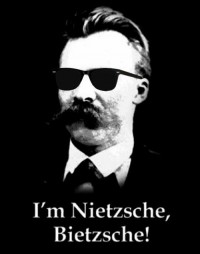Tags

Both Marx and Nietzsche elaborated original, sophisticated, and highly unorthodox approaches to ethics, and both of them grounded their approaches in history.
Marx held that freedom was the highest ethical goal, and he saw the attainment of that freedom through the working out of the processes of historical materialism, whereby ancient slavery, medieval serfdom, and ultimately bourgeois capitalism rose and fell in succession.
Nietzsche also held freedom to be the highest goal, but a freedom to become one’s self, untrammeled by the “slave” morality of self-denial and asceticism. In their ethical thought, Karl Marx and Friedrich Nietzsche followed very different approaches to arrive at a conception of personal fulfillment.
Karl Marx’s approaches to ethics have led to a great deal of perplexity and controversy. Although a deep ethical current runs through Marxian thought, Marx himself presented his work primarily as social science (Sayer, 2012). Even his critique of capitalism and promotion of communism, the very ideas which made him perhaps the most influential political thinker of the modern age if not all time, is presented in terms of historical materialism.
This said, a deeper understanding of Marx goes a long toward clearing up the seeming paradox. In truth, Marx is a deeply ethical thinker, and the key to understanding his ethical approaches lies in his own account of where, exactly, values come from (Sayer, 2012).

Marx’s ethical concern was the attainment of freedom, and it was this that fueled his opposition to the capitalist mode of production (Brenkert, 2013). This was chief ethical concern, but he also believed that all values, all ethical standards and mores, derived from historical and social forces.
In this Marx duly acknowledged his debt to Hegel: like Hegel, Marx held that social and historical forces give rise to ideas about morality and ethics, including Marx’s own ideas (Sayer, 2012). More specifically, Marx saw progress in these processes, as societies followed a succession of “modes of production” or developmental stages.
The conflicts generated by each mode of production undermined it, leading to the birth of a new order. Thus ancient slavery gave way to medieval feudalism, which in turn gave way to modern capitalism—which would at some point give way to communism (Brenkert, 2013; Sayer, 2012). The overall progression, however, was toward freedom, and Marx saw this as both a desirable state and as a description of how the social world actually works (Brenkert, 2013).

Where ethics are concerned, Friedrich Nietzsche is most famous for his rejection of morality as something “bad” that should be not only rejected, but actually overcome. Indeed, Nietzsche is famously known as the first “immoralist” for his anti-morality stance (Clark, 2015).
The essence of Nietzsche’s thought on this point is that there are higher systems of values than the moralities with which society is familiar. The reason morality occasioned such animus in Nietzsche was his own believe that morality held people back from their true, and splendid, potential. So long as “morality” reigns supreme in society, Nietzsche says, humans will fail to attain true greatness (Leiter, 2003).
Like Marx, Nietzsche sought the origins of morality in history. However, his scenario was very different: Nietzsche believed that both traditional Judeo-Christian morality and its modern, secularized counterpart had their origins in “slave” morality, and exalted the ascetic ideals of weakness and self-effacement (Leiter, 2013).
“Master” morality, on the other hand, exalted the individual. For those who could grasp the will to power, “master” morality could propel them to a true fulfillment of everything they could become.

Personal fulfillment in freedom is a common theme in the works of both Marx and Nietzsche. Their thought evinces a great many differences: Marx was concerned with the overthrow of oppressive power structures, while Nietzsche decried “slave” morality and championed “master” morality. Nonetheless, the convergence between the two is notable, inasmuch as both were concerned with attaining a conception of freedom from societal strictures.
References
Brenkert, G. G. (2013). Marx’s ethics of freedom. New York: Routledge.
Clark, M. (2015). Nietzsche on ethics and politics. New York: Oxford University Press.
Leiter, B. (2003). Routledge philosophy guidebook to Nietzsche on morality. New York: Routledge.
Sayer, S. (2012). Marx. In T. Angier (Ed.), Ethics: The key thinkers (pp. 175-196). New York: Bloomsbury.

Pingback: The Recipe: How to Write on Marx and Nietzsche | The Essay Kitchen